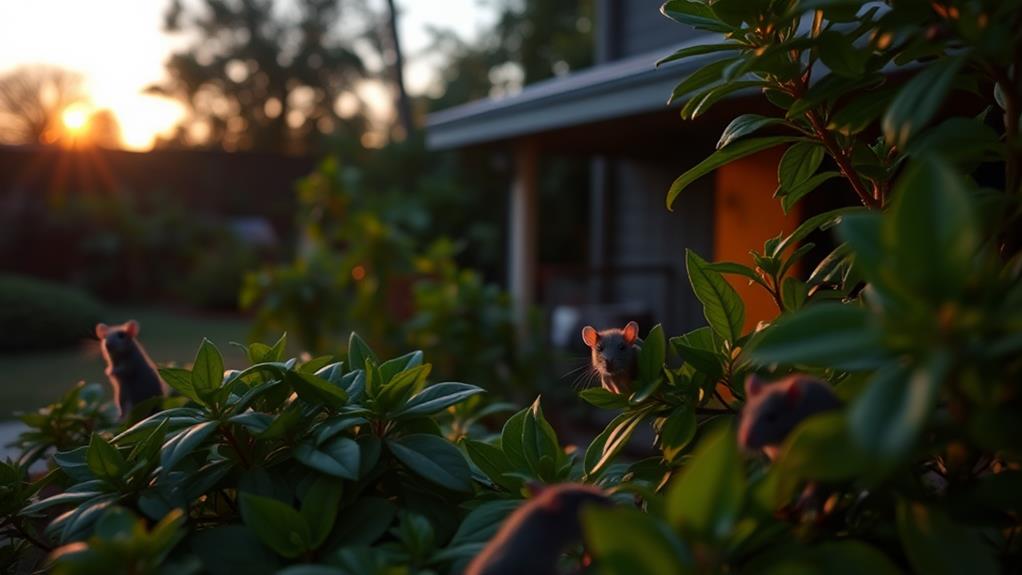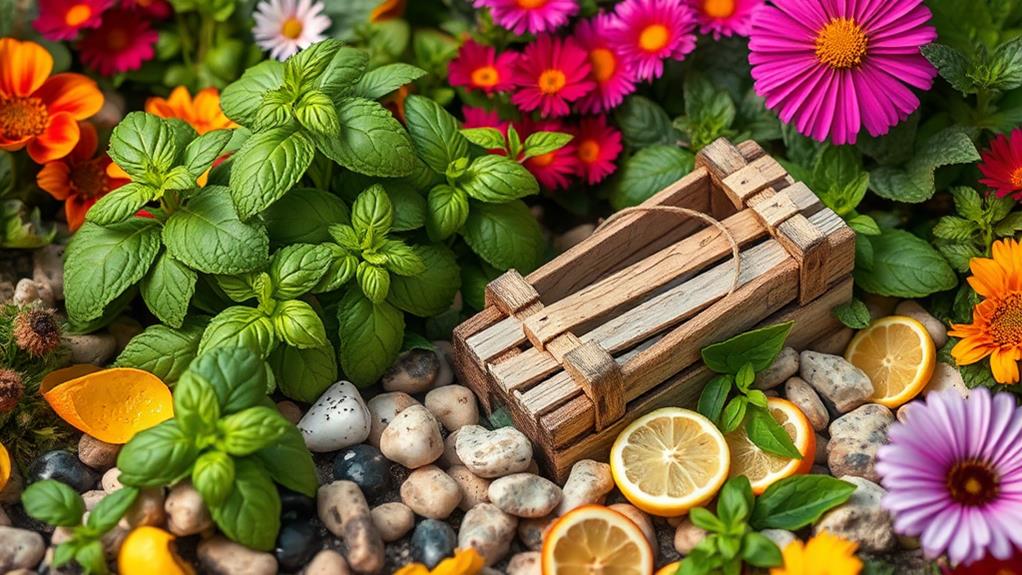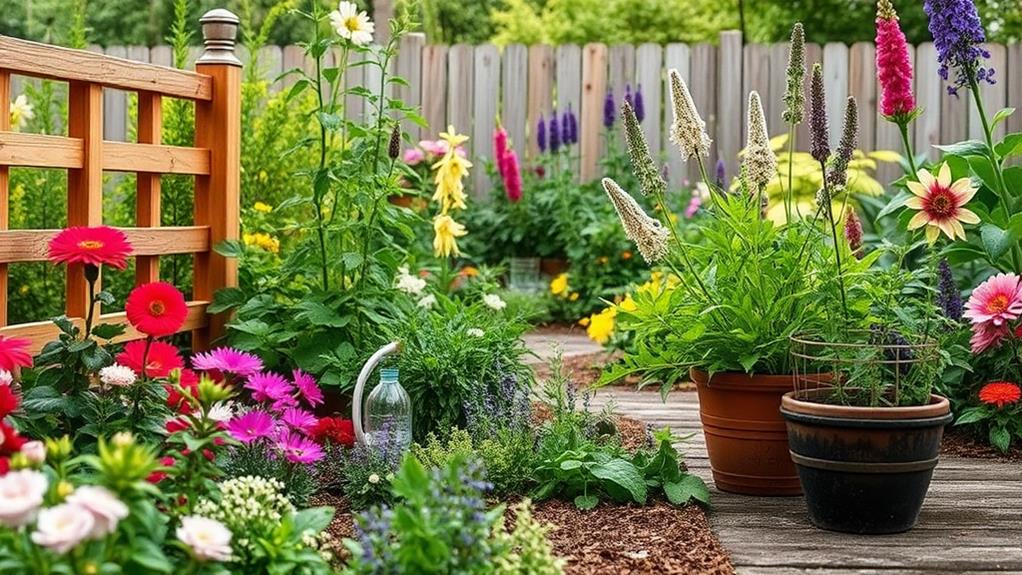If you're dealing with pesky rats in your garden home, it's essential to understand their behavior and how they invade your space. You might notice signs like droppings or chewed plants, which indicate an infestation. By employing natural deterrents such as peppermint oil and cayenne pepper, you can create an environment that discourages these unwelcome guests. But that's just the beginning. To truly secure your garden against these pests, you'll want to explore a few additional strategies that can make a significant difference.
Understanding Rat Behavior

Understanding rat behavior is essential for effective pest control. Rats are clever little critters, and they've got some interesting habits.
First off, they're social animals. You might see them in groups, chatting it up like they're at a party! They love to explore, so if there's food or shelter, you can bet they'll be checking it out.
Rats are nocturnal, which means they come out to play when it's dark. They're sneaky, too, often finding ways into your home through tiny gaps. They're also very cautious; if they sense danger, they'll avoid that area. So, if one of your traps goes off, don't be surprised if the others suddenly decide to steer clear.
Another fun fact? They're great at remembering routes. Once they find a good path, they'll stick to it. If you can figure out where they're coming from, you can block their way.
Knowing these behaviors can help you be a step ahead. Think of it like a game of chess, where you're outsmarting your furry opponents! By understanding how they think and act, you'll be better equipped to keep them away from your garden home.
Identifying Signs of Infestation
Recognizing the signs of infestation is key to keeping rats at bay. If you want to protect your garden, you've got to be on the lookout for a few telltale signs.
First, check for droppings. Rat droppings are usually dark and pellet-shaped, about the size of a raisin. If you see these little "chocolate chips" near your plants, it's a red flag!
Next, look for gnaw marks. Rats are known for their chewing habits. If you find bite marks on your garden furniture, plant stems, or even your fruits and veggies, you might've some furry visitors.
Also, keep an eye out for nests. These can be made from shredded materials like paper, leaves, or grass and are often hidden in sheltered spots.
Another clue is unusual sounds, especially at night. If you hear scratching or scurrying noises, it might mean rats are making themselves at home.
Finally, be aware of unusual tracks in soft soil or dust. Rat footprints are small and can help you pinpoint their activity.
Natural Deterrents and Repellents

One effective way to keep rats away from your garden is by using natural deterrents and repellents. You might be surprised to learn that there are plenty of easy-to-find options right in your kitchen or garden!
For example, rats dislike strong smells, so try using peppermint oil. Just soak some cotton balls in the oil and place them around areas where you've spotted rat activity. They'll be packing their little bags in no time!
Another great option is using cayenne pepper or crushed garlic. Sprinkle these around your garden beds. Not only will it make your garden smell interesting, but it'll also send those pesky rats running for cover.
You could also plant herbs like mint or lavender, which rats avoid. Plus, they smell lovely!
Don't forget about sound! Rats aren't fans of loud noises, so consider placing wind chimes or even a radio on low volume near your garden. This way, you'll create an environment that's less inviting for them.
Remember, keeping your garden clean and tidy also helps. If rats don't find food, they won't stick around!
Safe Traps and Baits
When dealing with pesky rats, safe traps and baits can be a game changer in your pest control strategy. Instead of using harmful poisons, consider humane traps that catch rats without hurting them. You can find these at most gardening or hardware stores.
Just remember to check them daily; you don't want any little critters stuck there longer than necessary!
Now, let's talk about baits. Try using natural options like peanut butter or sunflower seeds. Rats can't resist them! Place the bait inside the trap, and you're good to go.
Just make sure to keep your traps away from pets and kids. Safety first, right?
If you do catch a rat, release it far away from your garden, so it won't come back to haunt you! You might even feel a bit like a superhero, saving your garden from the rodent invasion.
Using safe traps and baits not only helps you control the rat population but also keeps your garden a healthy place for plants to thrive.
Preventive Measures for Gardens

Consistently maintaining a clean and organized garden can greatly reduce pest problems before they even start. Start by clearing away any fallen fruits, veggies, or plant debris. These tasty treats can attract pesky rats, and nobody wants that!
Next, keep your garden tools neatly stored. If you leave them lying around, they might become cozy hiding spots for unwanted visitors.
You should also consider planting strong-smelling herbs, like mint or basil. Rats dislike these scents, so your garden will smell pleasant while keeping them at bay.
And don't forget about your compost—make sure it's securely contained. An open compost pile is like an all-you-can-eat buffet for hungry critters.
Lastly, check your fences and gates regularly. If you spot any holes or gaps, patch them up quickly. Remember, it's way easier to prevent a rat party than to kick out the uninvited guests later.
Maintaining a Rat-Free Environment
To maintain a rat-free environment, start by regularly inspecting your property for potential entry points. Look for cracks in walls, gaps around doors, and holes near pipes. If you find any, seal them up—rats can squeeze through surprisingly small spaces!
Next, keep your garden tidy. Remove any debris, fallen fruit, or overgrown plants where rats might hide or feast.
Don't forget about food storage! Keep your trash cans tightly closed and store food in sealed containers. Rats love a good snack, and you don't want to be their buffet.
Also, consider adding natural deterrents like peppermint oil. Rats dislike the strong scent, and it can keep them at bay. Just mix some drops with water and spray it around your garden.
Lastly, check your garden regularly for signs of rat activity, like droppings or gnaw marks. If you spot anything suspicious, act quickly to address the issue.
